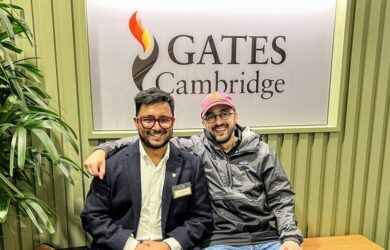Mohammad Ghassemi knows the value of education. Not only did his father act as an inspiring role model - arriving in the US from Iran with less than $100 in his pocket, working three jobs while studying and rising to professor of Chemical Engineering at New Mexico University - but his mother home schooled all her children because she felt that was the best way to ensure they had an excellent foundation in life.
Ghassemi’s father is the first person in his family to go into higher education. “He has a great reverence for education, believing it is the route to empowerment and that was the culture we grew up with at home,” says Ghassemi. He describes his mum, a Norwegian American, as “a brilliant woman”. She was all set on going to medical school when her first child was born and decided instead to dedicate herself to teaching her children. Ghassemi is the third of five children.
He says his mum had high standards – 95% was a pass rate for her. Anything less was a fail. “She thought you could not move forward unless you understood the basics. She wanted to make sure we didn’t have a weak foundation,” says Ghassemi, who grew up in Las Cruces, New Mexico.
His mum had thought through the pros and cons of home schooling and, he says, encouraged independent learning from an early age. This proved invaluable to Ghassemi when he started university. “She would let me get ahead on my own in the subjects I excelled in, such as maths, and then turn her attention on any weaknesses,” he adds.
She taught the children in different ways. Some classes, such as art or history, were taught around the dining table in a group. Others were set individually so the siblings would study on their own. Ghassemi’s mum would encourage them to find solutions to any problems themselves, sometimes leaving them for an hour to work things out for themselves before giving them any hints. “In so doing, she built in us the independent curiosity necessary for doing well,” he says, adding that one of his older sisters got a Marshall scholarship and is just finishing up at Oxford.
Ghassemi says the high standards at home made university quite easy by comparison. “I would panic much more before homeschooling exams than before any at freshman level,” he laughs.
His parents were also keen to ensure that their children did not miss out on the social side of going to school and encouraged them to play out with friends. They also benefited from being a big family. Ghassemi says he knows another homeschooled child who didn’t have many friends or siblings and he had problems fitting into university. This was not the case for the Ghassemi children.
Ghassemi himself started university at just 15. He did a double major in electrical engineering and applied mathematics with a minor in computer science at New Mexico State University, which took five years to complete. During this time, he won a highly prestigious Goldwater scholarship for maths, science and engineering undergraduates and he graduated as the University's Outstanding Engineering Senior.
Now aged 22, he says he spent a lot of time at university doing community work. He volunteered to work at the maths centre fairly early on in his degree. He says he had a lot of free time because he was quite far advanced in maths so he devoted himself to helping other students. One student recognised his skills in explaining things and suggested he run for Vice President of External Affairs for the university’s Engineering Council. He was elected and worked hard to encourage the members to become more active in voluntary work, such as helping elderly people and orphaned children. He set up a points system which rewarded those who did the most community service and the Council won an award for being the most philanthropic engineering council in the US. Ghassemi was awarded the President’s Volunteer Service Award for his achievements and soon after became the youngest student in the history of his university to serve as president of the National Association of Engineering Student Councils for the western US region.
“My aim was to create a community service culture,” says Ghassemi. In addition, due to his interest in education, he gave workshops in science and maths at local schools and encouraged those whose families had no tradition of going on to higher education to consider it as a possibility. “I spoke about my dad and tried to motivate them,” he says. “I saw students with a lot of potential and would feel devastated if they were to give up on themselves.”
He also wanted to help children in a more personal way and, after meeting a social worker who worked with abused children, became a Court Appointed Special Advocate for abused children. He received around 50 hours of training and has been working with two young siblings in recent months. His role is to get to know them and pass on his observations to their social worker. He says social workers are often too overworked to be able to spend a lot of time with the children in their caseload and may miss crucial evidence as a result.
At Cambridge, Ghassemi, who is married and will move to the city with his wife, a teacher, will study for an MPhil in Bioscience Enterprise. Indeed, since graduating from New Mexico State University he has developed two patents.
He was selected for a Gates scholarship following a snow-bound interview in Annapolis in February and is the first Gates Cambridge scholar from his university. He says he has always been interested in the biological application of electronics and engineering. He is currently working with the Mind Research Network, for instance, looking at ways of getting complex data about the links between DNA and brain functioning. “In the future,” he says, “I imagine myself working to create engineering applications to help with biological problems.”
The reasons he chose to apply to Cambridge link to this. He lists them: because of the University’s expertise in developing and introducing biological applications to the market, because the course he will do has a very international focus, because its work in bioscience engineering is world renowned and because of the students he will meet on his course. “Cambridge is really known for being an excellent academic institution, but also for attracting entrepreneurial students who have big ideas,” he says. “From my research and talking to other academics, Cambridge has the perfect culture of intellectualism and entrepreneurial drive that I want.”












